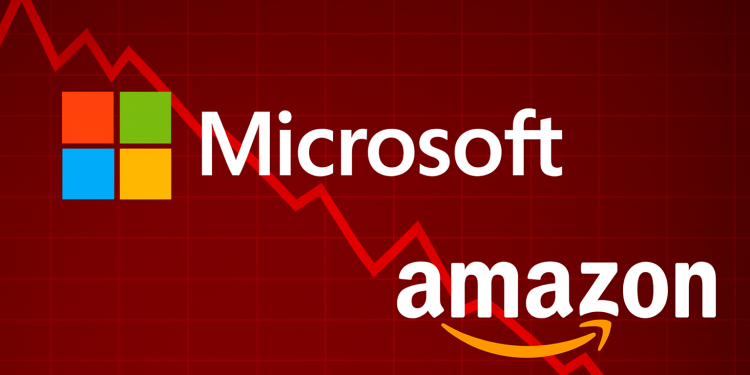Shares of Microsoft and Amazon came under renewed pressure on Tuesday as a rare analyst downgrade and fresh regulatory scrutiny from the European Union weighed on two of Wall Street’s most influential technology stocks.
The dual setbacks added to concerns that optimism around the generative AI boom may be cooling, with investors reassessing stretched valuations and the sector’s long-term profitability.
Rothschild & Co Redburn analyst Alexander Haissl cut his ratings on both companies to neutral from buy, marking his first downgrade since initiating coverage in 2022.
The move coincided with an announcement from the European Commission that it had opened investigations into whether Amazon Web Services and Microsoft Azure should be designated as gatekeepers under the Digital Markets Act.
Microsoft fell 3.2% in early trading, while Amazon dropped nearly 4%.
Bull case for generative AI ‘looks increasingly misplaced’
Haissl’s downgrade challenges one of the strongest consensus views in the market: that hyperscalers remain the biggest beneficiaries of the AI investment cycle.
He wrote that the bull case for generative AI “looks increasingly misplaced,” arguing that the economics underpinning the sector are far weaker than widely assumed.
He pointed to the heavy capital expenditure required to build out AI infrastructure, noting that the depreciation schedules used for current-generation GPUs and servers already assume five to six years of economic life — far longer than in the early cloud era.
This, he said, implies significantly higher capital intensity at a time when pricing power is limited.
Investors have grown wary in recent weeks over the pace of spending across the industry, amid fears that assets may lose value faster than companies expect.
Hedge fund investor Michael Burry has added to the conversation with cryptic remarks on depreciating AI-related hardware, fuelling unease over whether hyperscalers may be overbuilding capacity.
Haissl’s decision stands in contrast with the broader analyst community.
More than 90% of analysts covering Microsoft and Amazon maintain buy-equivalent ratings, with none assigning sell recommendations, according to Bloomberg data.
Both stocks have delivered substantial gains since Haissl first recommended them in 2022, with Amazon more than doubling and Microsoft rising 98%.
His track record includes a well-timed sell rating on Oracle, whose shares have fallen about 25% since September.
However, his downgrade of Snowflake in March was followed by a significant rally, underscoring the difficulty of calling turns in the high-growth software sector.
Rothschild & Co Redburn cut Microsoft’s price target to $500 from $560 while keeping Amazon’s unchanged at $250.
EU probes add regulatory uncertainty
The EU’s parallel announcement further unsettled the market.
Regulators are examining whether AWS and Azure — despite not meeting formal user thresholds — operate as “important gateways” between businesses and consumers, a key test for gatekeeper designation.
Such a label would impose stricter obligations on the companies under the bloc’s Digital Markets Act.
“We will also look at whether the DMA’s existing rules need to be updated so Europe can keep pace with fast-evolving practices in the cloud sector,” EU antitrust chief Teresa Ribera said in a statement.
Although Amazon Marketplace and Microsoft’s LinkedIn are already classified as gatekeepers, extending the label to cloud units would be a significant escalation.
The Commission said market data showed that AWS and Azure hold “very strong positions,” warranting deeper scrutiny.
A Microsoft spokesperson said the company was ready to contribute to the enquiry, while an AWS spokesperson said “designating cloud providers as gatekeepers isn’t worth the risks of stifling invention or raising costs for European companies.”
The probes come as global regulators intensify efforts to bring dominant technology firms under tighter oversight, adding another layer of complexity to the investment case for large cloud providers.
The post Microsoft and Amazon stocks fall on rare downgrade questioning AI optimism appeared first on Invezz













